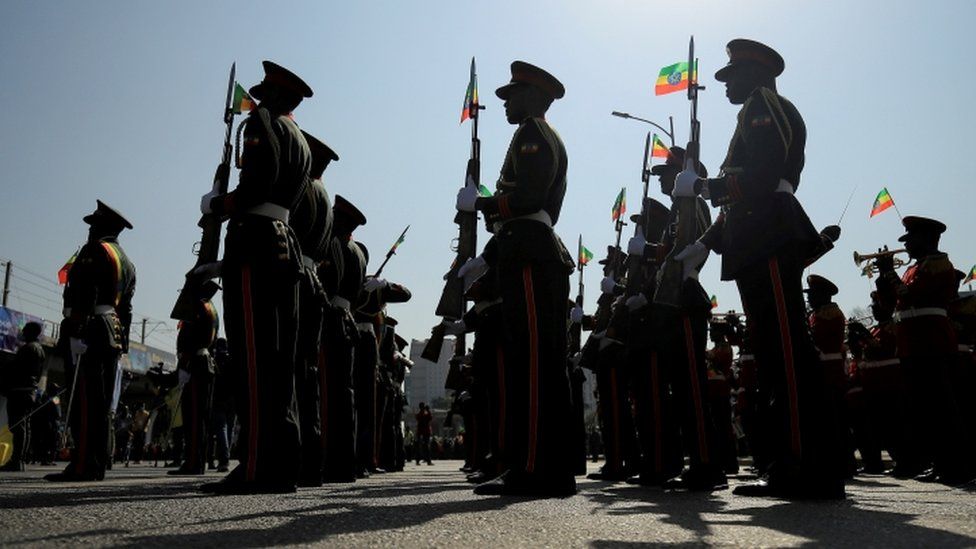By Charlotte Vreden
Recently, Ethiopian Authorities declared a six-month state of emergency in Ethiopia, bracing as Tigrayan rebels advance and calling for citizens to take up arms to defend their capital: Addis Ababa. But who are the Tigrayans and the Tigray People’s Liberation Front (TPLF), and what are the consequences of the government’s recent actions?
Together with the Kebessa (highland) Eritreans, to whom they are ethnically tied by history, economic interdependence, myth, language, and religion, the Tigrayans fought an oppressive Amhara (Indigenous group to Ethiopia) ethnic state for several decades. During the conflict, both Tigrayans and Eritreans took different political entities. After their joint military victory in the ’90s, they followed separate paths as Eritreans created the newest African state, whereas Tigrayans stayed in Ethiopia.[1] Moreover, the TPLF is a left-wing ethnic nationalist paramilitary group, formerly ruling- and now a leading political party in Ethiopia.[2] The group is a product of the marginalisation of the Tigray in Ethiopia, rooting in the late 19th century when Ethiopia took its current shape, as they continue to seek national self-determination- and equality among Ethiopian nationalities. Starting in the ’60s, Tigrayan students created a political and student association of Tigrayans which gradually developed into the TPLF.[3]
However, under Prime Minister Abiy Ahmed, the Ethopian government labels the TPLF as a terrorist organisation.[4] PM Ahmed ordered a military operation in Ethiopia’s northern Tigray region in November 2020, triggered by a military raid carried out by the TPLF. Even though the operation was supposed to be a short one, the TPLF has recaptured Tigray and even moved towards Addis Ababa- Ethiopia’s capital and headquarter of the African Union.[5]
A newly formed alliance of Ethiopian opposition factions was recently announced, aiming to topple the government and form a transitional government. Nevertheless, the government rejected the opportunity for an alliance thus far, accusing members of past ethnic violence. The UN Security Council urged to end the fighting and expressed deep concern about the intensification of military clashes as the war already killed thousands of people and forced millions to leave their homes in the past weeks.[6]
Equally concerning are the war crimes and crimes against humanity committed during the war on all sides. A recently published report of a joint investigation by the UN and the Ethiopian Human Rights Commission (EHRC) discloses “a series of violations and abuses including unlawful killings and extra-judicial executions, torture, sexual and gender-based violence, violations against refugees, and forced displacement of civilians.”[7] Moreover, the state of emergency declared by PM Ababa comes with questionable measures. Aside from people having to register their weapons and gather in their neighbourhoods, authorities conduct house-to-house searches and “troublemakers” are arrested. Anyone violating the emergency, which could be providing financial, material, or moral aid to “terrorist groups”, can face three to ten years of prison. Jeffrey Feltman, a US special envoy for the Horn of Africa, explained the harmfulness of the Abiy government’s actions; besides the human rights violations, looting, displacement, rape, and sexual violence as tools of war, signs of famine were revealed, and the government’s restrictions further prevented humanitarian help to get to the people.[8]
[1] Alemseged Abbay, Identity Jilted, Or, Re-Imagining Identity?: The Divergent Paths of the Eritrean and Tigrayan Nationalist Struggles (The Red Sea Press, 1998).
[2] Wolbert G C Smidt, ‘Parlamentswahlen in Äthiopien’, Afrika Spectrum 40, no. 2 (2005): 319–30.
[3] Kiflu Tadesse and Thomas Leiper Kane Collection (Library of Congress. Hebraic Section), The Generation: The History of the Ethiopian People’s Revolutionary Party (Silver Spring, MD; Trenton, N.J.; Lanham: Distributed by K & S Distributors ; Red Sea Press ; University Press of America, 1993).
[4] ‘Ethiopia to Designate TPLF, OLF-Shene as “Terror” Groups’, accessed 8 November 2021, https://www.aljazeera.com/news/2021/5/1/ethiopia-to-designate-tplf-olf-shene-as-terror-groups.
[5] Stanly Johny, ‘TPLF | Rise, Fall and Return of Tigrayan Rebels’, The Hindu, 6 November 2021, sec. International, https://www.thehindu.com/news/international/tplf-rise-fall-and-return-of-tigrayan-rebels/article37359025.ece.
[6] ‘Ethiopian Opposition Factions Join Forces to Bring down Prime Minister Abiy Ahmed’, France 24, 6 November 2021, 24, https://www.france24.com/en/africa/20211106-ethiopian-opposition-form-alliance-to-bring-down-pm.
[7] ‘OHCHR | Tigray Conflict: Report Calls for Accountability for Violations and Abuses by All Parties’, accessed 9 November 2021, https://www.ohchr.org/EN/NewsEvents/Pages/DisplayNews.aspx?NewsID=27756&LangID=E.
[8] Patrick Wintour, ‘Ethiopia Declares State of Emergency as Tigrayan Rebels Gain Ground’, The Guardian, 2 November 2021, sec. World news, https://www.theguardian.com/world/2021/nov/02/ethiopia-declares-state-of-emergency-as-tigray-rebels-gain-ground.
sources
Abbay, Alemseged. Identity Jilted, Or, Re-Imagining Identity?: The Divergent Paths of the Eritrean and Tigrayan Nationalist Struggles. The Red Sea Press, 1998.
‘Ethiopia to Designate TPLF, OLF-Shene as “Terror” Groups’. Accessed 8 November 2021. https://www.aljazeera.com/news/2021/5/1/ethiopia-to-designate-tplf-olf-shene-as-terror-groups.
France 24. ‘Ethiopian Opposition Factions Join Forces to Bring down Prime Minister Abiy Ahmed’, 6 November 2021. https://www.france24.com/en/africa/20211106-ethiopian-opposition-form-alliance-to-bring-down-pm.
Johny, Stanly. ‘TPLF | Rise, Fall and Return of Tigrayan Rebels’. The Hindu, 6 November 2021, sec. International. https://www.thehindu.com/news/international/tplf-rise-fall-and-return-of-tigrayan-rebels/article37359025.ece.
Kiflu Tadesse and Thomas Leiper Kane Collection (Library of Congress. Hebraic Section). The Generation: The History of the Ethiopian People’s Revolutionary Party. Silver Spring, MD; Trenton, N.J.; Lanham: Distributed by K & S Distributors ; Red Sea Press ; University Press of America, 1993.
‘OHCHR | Tigray Conflict: Report Calls for Accountability for Violations and Abuses by All Parties’. Accessed 9 November 2021. https://www.ohchr.org/EN/NewsEvents/Pages/DisplayNews.aspx?NewsID=27756&LangID=E.
Smidt, Wolbert G C. ‘Parlamentswahlen in Äthiopien’. Afrika Spectrum 40, no. 2 (2005): 319–30.
Wintour, Patrick. ‘Ethiopia Declares State of Emergency as Tigrayan Rebels Gain Ground’. The Guardian, 2 November 2021, sec. World news. https://www.theguardian.com/world/2021/nov/02/ethiopia-declares-state-of-emergency-as-tigray-rebels-gain-ground.
Image source: https://www.bbc.com/news/world-africa-59395482

